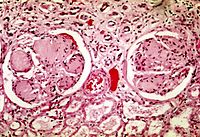
Photo from wikipedia
Macrovascular complications such as atherosclerosis, myocardial infarction and stroke, and microvascular complications such as nephropathy, retinopathy, and neuropathy are the major causes of increased morbidity and mortality in both type… Click to show full abstract
Macrovascular complications such as atherosclerosis, myocardial infarction and stroke, and microvascular complications such as nephropathy, retinopathy, and neuropathy are the major causes of increased morbidity and mortality in both type 1 and type 2 diabetes. Increased inflammation, oxidative stress, and fibrosis are common features in most diabetes complications. Although extensive studies have examined the biochemical pathways leading to the expression of inflammatory, profibrotic, and other pathological genes, as well as genetic factors related to diabetes and associated complications, much less is known about the contribution of epigenetic changes that occur without alterations in the DNA sequence. Environmental factors, lifestyles, and improper diet implicated in diabetes can affect epigenetic states. Epigenetic modifications, including DNA methylation and histone modifications, can alter gene transcription in response to environmental stimuli and cooperate with noncoding RNAs. These epigenetic modifications have been observed in various target cells under diabetic conditions. Moreover, epigenetics has also been implicated in the phenomenon of metabolic memory observed in clinic trials and animal studies, in which prior episodes of poor glycemic control can confer continued risk of complications despite subsequent glucose normalization. Epigenome-wide association studies in cohorts with diabetes are uncovering epigenotype variations that provide new insights into diabetic vascular complications. Here, I discuss the role of epigenetics and noncoding RNAs in diabetes complications and metabolic memory, and their translation potential to serve as biomarkers and drug targets to improve clinical management of diabetic vascular complications.
Journal Title: Diabetes
Year Published: 2021
Link to full text (if available)
Share on Social Media: Sign Up to like & get
recommendations!